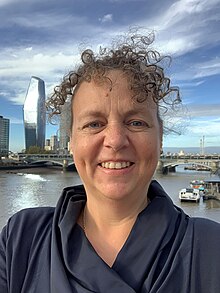Career
Associate Professor and IOE Head of Research Ethics and Integrity at University College London, and Director of Social Research & Practice and Education Ltd. [1]
Brown researches physical and material representations of experiences, the generation of knowledge and use of metaphors to express what is difficult to express, and more generally, research methods and approaches to explore identity and body work.
Brown is an editor for the Journal of Participatory Research Methods, [2] Disability and Society, [3] and The Qualitative Report. [4] She is a long-standing member of methodologically-orientated organisations, such as the Pedagogy Network of the National Centre for Research Methods [5] and the Centre for Imaginative Ethnography. [6]
Brown is regularly invited as a keynote presenter and workshop leader, as for example for the National Centre for Research Methods, the Social Research Association, [7] the American Association for Public Opinion Research, [8] Photovoice Worldwide, [9] as well as symposia and network conferences. [10] [11] [12] On 26 June 2023 Brown delivered the keynote for the European Educational Research Association's Summer School in Porto. [13]
Her exploration of research paradigms, data collection methods, and data analysis recognises the researchers' interactions with the field of study, the research participants, the research contexts, and settings, as well as the variety of practices involved in developing understanding and generating knowledge through thinking-doing-being. [14] In that sense, her creative practices as a fiction writer and poet as well as her activist work in response to, on the back of and as research represent an extension of her conceptualisation of research practice that interweaves practice/teaching/research.
This page is based on this
Wikipedia article Text is available under the
CC BY-SA 4.0 license; additional terms may apply.
Images, videos and audio are available under their respective licenses.
